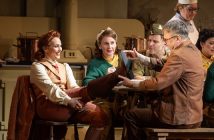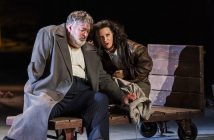A tried and tested formula such as Richard Eyre’s 1994 production of La Traviata would be difficult to ruin (although it can, undoubtedly, be done), but there was a marked frisson in the air at The Royal Opera House at the weekend as both audience and performers geared up for an unpredictable casting which, thankfully, paid off a treat.
Losing your Alfredo on the day of a performance in which both Violetta and Giorgio Germont would be making their Covent Garden débuts, might just give a director cause for concern. So it was just as well that Daniel Dooner had his troupe on such excellent form, with a wonderfully sturdy supporting ensemble and chorus for a very new, and understandably nervous, Samuel Sakker, who nevertheless certainly had a good grip of the role overall. The Australian Jette Parker Young Artist was filling in for Albanian tenor Saimir Pirgu, and did an admirable job with textbook technique and a sympathetic ear. The first act was a fraction on the starchy side, with notable tension between this Alfredo and his beloved Violetta (Venera Gimadieva), but their chemistry blossomed as the evening progressed, and as he’s meant to be on the diffident side at first, the characterization didn’t seem too off.

Venera Gimadieva as Violetta ©-ROH
These nerves seemed to be shared by conductor Yves Abel, who steered the orchestra somewhat disconcertingly into Act One with an undeniably wobbly grasp on the tempo, Verdi’s jaunty off-beats threatening to turn taunting. Like the singers, the orchestra seemed to settle down in time, so perhaps this was part and parcel of having such an unknown quantity up on stage.
Yet with a Violetta such as that, there really should have been no need to worry. With warmth, delicacy and an endearing girlishness, Gimadieva’s fateful courtesan was as beautiful and heartbreaking as one could hope. A pure and soothingly light timbre was enhanced by achingly musical phrasing, lines often reeling off into the air with pained expression – at times purely emotional, at others apparently due to her consumptive state – and the control required for this is something quite stunning. The Russian soprano, who has previously impressed in the role at Glyndebourne, also makes a highly modern actress, maintaining a glowing presence on stage often with the most minimal of movements; her dignified response to the pleas of Alfredo’s father, Giorgio as he begs her to leave his son merely has her sitting taller and taller, her teeth seeming to grind ever harder as she tries to turn respectfully away from him.

Venera Gimadieva as Violetta © ROH
This dynamic with Giorgio Germont was in itself compelling, Luca Salsi providing the meddlesome role with noble heft and a sumptuous richness of tone – an Italian baritone with true Italianate style. And one flits between anger at and sympathy for the older gentleman who truly seems to realise his mistake in separating the two lovers in the end, albeit once it is all too late, making the denouement as tear-jerking as it darned well should be.
As expected in this production, the ultimate tragedy of Dumas fils’ Parisian tale is further highlighted by the contrast of this bleakness with the glistening lights and colours of Bob Crowley’s set and Jean Kalman’s lighting: it’s hard to beat a vision such as the golden bowl of a ballroom in which we first meet Violetta, her vast white dress beaming against the black silhouettes created by the suits of the gentlemen. And the high-ceilinged room in which she finally succumbs to her disease has an ethereal brightness that belies the gruesomeness of her physical demise, hinting at the peace she is ultimately able to find as she is reunited with the lover who had fled in anger, unknowingly leaving her to die alone.
There are no surprises to be had at the Opera House with this Traviata, but there are some delightful performances that do the story, the music, and this good’un of a production justice in full: a success.
Richard Eyre’s production of La traviata at the Royal Opera House on selected days until 19th March 2016. For more information and tickets visit the website.




